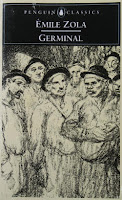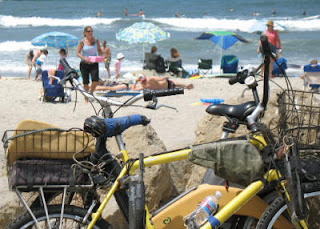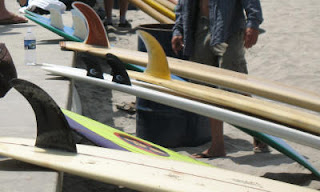Bonds's record dinger, in the fifth inning of a night game against the Washington Nationals at Petco Park, in San Francisco, came at his third at-bat of the evening . . .Please tell Roger Angell that PetCo Park is in San Diego, not San Francisco as his article states. While one might forgive and even understand how such an embarrassing blunder could occur given that the Padres were involved in Bonds’s homerun record chase (see my own report here), nevertheless, confusing San Diego’s PetCo Park with San Francisco’s AT&T Park is bush league. I might think that Angell either isn’t a baseball fan or, more likely, such an East Coast-centric fan that to him the National League West Division is the geographic equivalent of, say, Afghanistan. Would the editors of the New Yorker let slip the phrase “at Fenway Park in New York”? I don’t think so.
Friday, August 24, 2007
One of Them Spanish-Sounding West Coast Cities
Letter to the Editor regarding: At the Plate: Deathly Numbers, by Roger Angell, The New Yorker, August 20, 2007.
Labels:
Sports
Wednesday, August 22, 2007
More Signs of Summer
 I can't help it. The beach has been the needed oasis of cool. Water temperatures have reached bath tub levels—the high side of 75—allowing me to stay waterside for a good hour. Wave after wave—when the shoulder right (or left) is there, you take it.
I can't help it. The beach has been the needed oasis of cool. Water temperatures have reached bath tub levels—the high side of 75—allowing me to stay waterside for a good hour. Wave after wave—when the shoulder right (or left) is there, you take it. Serenity.
Serenity. Follow the footsteps in the sand.
Follow the footsteps in the sand. The fishermen, the sea gulls, the surfers, the swimmers. We all share the glories of the seashore.
The fishermen, the sea gulls, the surfers, the swimmers. We all share the glories of the seashore.
Labels:
Coastal Cravings,
Fun
Monday, August 20, 2007
Wednesday, August 15, 2007
Luscious Tomatoes
 and other veggies too. While I certainly try, I cannot possibly eat all of these tomatoes. Even after multiple pasta sauces, roasted vegetable ratatouille, minestrone soup, fresh tomato and cucumber salad, and fresh tomato slices on ... everything. I am thinking of a roasted tomato garlic purée ...
and other veggies too. While I certainly try, I cannot possibly eat all of these tomatoes. Even after multiple pasta sauces, roasted vegetable ratatouille, minestrone soup, fresh tomato and cucumber salad, and fresh tomato slices on ... everything. I am thinking of a roasted tomato garlic purée ...Recipe: Roasted Tomato Garlic Soup
1 head garlic, cloves separated and peeled
8 (approx.) medium tomatoes, preferably home grown
5 cups water or stock, divided
1 Ω teaspoon dried thyme leaves
1 teaspoon freshly ground black pepper
1 teaspoon coarse sea salt
4 tablespoons olive oil, divided
4 medium onions, thinly sliced
2 tablespoons chopped fresh Italian parsley, for garnish
- Preheat oven to 350 degrees F.
- Quarter the tomatoes and place them in a shallow roasting pan. Add the peeled garlic cloves. Drizzle with approximately 1 tablespoon olive oil. Add 3 cups of the water/stock. Sprinkle with the thyme, pepper, and salt.
- Cover the pan with aluminum foil and bake for 60 minutes, stirring once during the baking.
- Remove the foil, stir again, and bake for another 30 minutes.
- While the tomatoes and garlic are baking, heat 3 tablespoons olive oil in a soup pot. Add the sliced onions, cover and cook over medium heat until tender and lightly colored, about 15 minutes.
- Add the remaining 2 cups of water/stock to the onions and bring to a boil. Reduce the heat, cover, and simmer for about 30 minutes.
- When the tomatoes and garlic have finished baking, transfer them to the soup pot. Using a stick blender, purÈe the soup until smooth.
- Adjust the seasonings, ladle into soup bowls and sprinkle each bowl with fresh parsley.
6-8 servings.
Labels:
Garden Delights,
Recipes
Sunday, August 12, 2007
Being a Part of History at the Ballpark
“Hi, I just landed.” —me, from the airplane, landing at Lindberg Field, San Diego.
“Oh, man! It’s extra innings . . . did you hear what happened?” —Paul, from PetCo Park, Saturday night, August 4, Padres vs. the Giants.
“No, what’s up?” —curious, I’ve been ensconced in an airplane for the past four hours—I have no idea what’s going on.
“Bonds tied the record in the second inning. We are all here—Kellen, the two Kyles and I.” Father-son fantasy realized. Be at the ballpark when Bonds ties the record. Not a Giants fan. Not a Barry Bonds fan. But baseball history is baseball history. In person. They are there.
“Okay, call you later.” . . . thinking . . . He really does not want to leave the game early just to pick me up at the airport. Extra innings. No problem. I’ll get a cab. Pull out cell phone. Redial.
“What’s up?” he asks. It’s still extra innings.
“Hey. It’s me again. Look, I’ll get a cab to the Omni. Meet you at the bar.” I’ve just flown in from Canada, but you’re at the ballgame with our son and the boys. I can chill.
“Yeah! Great idea!” —obviously relieved— “Call me when you get here.” You’ve just flown in from Canada and I’m at the ballgame with our son and the boys. You can chill.
So I share a cab with a charming young woman who lives a few blocks from PetCo Park downtown San Diego. The Padres game has just ended when I arrive at the Omni (which connects to the ball field). The Padres win. Yeah. Here’s to you Barry, but the Padres won. Now you can go home and break the record in San Francisco. The Padres beautiful ball park is on the cover of SI just because Barry hits a home run. The game ran so late that the L.A. Times ran the story about Barry tying the record but did not record the winner of the game. So just in case anybody out there in baseball land doesn’t know: Barry hit his record-tying homerun against the Padres, but the Giants do not win. The Padres beat the Giants.
In fact, a mere three days later, Barry breaks the record in the Giants versus Washington Nationals game. The Giants do not win. The Nationals win the game.
But we aren’t going to remember all that. We’ll remember the father and the son who were able to witness baseball history live, in person, together. How cool is that?
“Oh, man! It’s extra innings . . . did you hear what happened?” —Paul, from PetCo Park, Saturday night, August 4, Padres vs. the Giants.
“No, what’s up?” —curious, I’ve been ensconced in an airplane for the past four hours—I have no idea what’s going on.
“Bonds tied the record in the second inning. We are all here—Kellen, the two Kyles and I.” Father-son fantasy realized. Be at the ballpark when Bonds ties the record. Not a Giants fan. Not a Barry Bonds fan. But baseball history is baseball history. In person. They are there.
“Okay, call you later.” . . . thinking . . . He really does not want to leave the game early just to pick me up at the airport. Extra innings. No problem. I’ll get a cab. Pull out cell phone. Redial.
“What’s up?” he asks. It’s still extra innings.
“Hey. It’s me again. Look, I’ll get a cab to the Omni. Meet you at the bar.” I’ve just flown in from Canada, but you’re at the ballgame with our son and the boys. I can chill.
“Yeah! Great idea!” —obviously relieved— “Call me when you get here.” You’ve just flown in from Canada and I’m at the ballgame with our son and the boys. You can chill.
So I share a cab with a charming young woman who lives a few blocks from PetCo Park downtown San Diego. The Padres game has just ended when I arrive at the Omni (which connects to the ball field). The Padres win. Yeah. Here’s to you Barry, but the Padres won. Now you can go home and break the record in San Francisco. The Padres beautiful ball park is on the cover of SI just because Barry hits a home run. The game ran so late that the L.A. Times ran the story about Barry tying the record but did not record the winner of the game. So just in case anybody out there in baseball land doesn’t know: Barry hit his record-tying homerun against the Padres, but the Giants do not win. The Padres beat the Giants.
In fact, a mere three days later, Barry breaks the record in the Giants versus Washington Nationals game. The Giants do not win. The Nationals win the game.
But we aren’t going to remember all that. We’ll remember the father and the son who were able to witness baseball history live, in person, together. How cool is that?
Labels:
Sports
Friday, August 10, 2007
Émile Zola's Germinal
 I selected Émile Zola’s Germinal for Book Club in June. I originally read the novel about 10 years ago and reread it for Book Club. By rereading it I’ve come to appreciate Zola’s work even more.
I selected Émile Zola’s Germinal for Book Club in June. I originally read the novel about 10 years ago and reread it for Book Club. By rereading it I’ve come to appreciate Zola’s work even more.When I first read Germinal, I came away with the idea that Zola wanted to address issues of economic classes, labor and society, and basic needs of working class people, such as health care and living wages. Sandwiched into these societal issues were more personal challenges such as love, loyalty, honesty, industry and the literary workings of a tragic character. Zola uses irony and he juxtaposes bourgeois families with poverty-stricken families.
The second time I read Germinal I still appreciated the tragic, uphill struggles of the miners and the individual characters that played a part in this epic story. But what was new to me was the feeling that Zola didn’t so much write a novel as he created a series of paintings that beg us to visualize his settings. We enter the museum (okay, I am visualizing now) and in the first room we see a beautiful but haunting painting of the early-spring landscape (April, or the germinal month), treeless with ugly slagheaps, smoke that curls into the grey sky, and grey figures that are but shadows trudging their way to the mine. It is a beautifully-wrought but haunting landscape.
The next painting perhaps shows old Bonnemort and his horse down in the pit. Over and over Zola portrays the mine as a living monster that devours the workers. We see the haphazard timbering, the hay, the wet walls, and the lamps that provide the only light. There is a sadness to Bonnemort’s face and we detect a bond between the man and the horse. The horse and the man are both slaves within the working mine. They bond because they suffer together.
Another painting shows several miners at work. Their shirts are off and their bodies are glistening with sweat. The air outside is cold, but in this living hell, temperatures rise dramatically. Their arms and shoulders which have worked in the mines for all their lives should be strong and steady. Instead, they seem weak and exhausted.
Still walking through the museum, we see an oil painting that depicts the Maheu’s family room. It’s early morning and Catherine is fixing coffee and building up the fire. Again, it is dark and the oil lamps and the fireplace provide the only lighting. She is careworn but young, a sad figure. Yet, there is somehow hope in her eyes. Hope that she can do better than her parents. Hope that she can find a way to create a comfortable living situation for herself. Hope that she can rise above the rabble.
The labor/union meeting in the woods is carefully composed. This painting is not quite a landscape, but larger than the intimate paintings we have seen of the miners. We see the group, with Étienne, Maheu, Rasseneur all prominently positioned with others eagerly looking on. The peasant dress, the lively discussions, and the fallen branches used as makeshift sitting places all help portray the intensity of the meeting.
I can imagine many more paintings. The pub, the company town of Montsou, and the mob scenes (there are several—Zola seems to excel at describing incredibly realistic and frightening mob scenes) all are adaptable to a visual representation.
I heartily recommend this novel.
And how relevant is a 19th century novel about working in a coal mine, dealing with fair pay and disasters where loved ones are trapped, maimed, or sick from breathing coal dust their whole lives? Surprisingly relevant.
March, 19, 2007: Siberian mine blast kills most in 10 years
“Labor union officials blamed the explosion in part on quota systems that encourage miners to work faster and dig more coal, potentially leading to errors. Some government officials in the past have accused private companies of cutting corners on safety measures in order to save money.” (Source)May 24, 2007: 38 killed in blast at Russian coal mine
And of course, a bit closer to home:
August 6, 2007: 6 trapped in Utah coal mine collapse
Lastly, Germinal is one novel in a 20-volume series depicting several families in 19th century France. Zola’s output is staggering, considering the depth of his characters, descriptions, and actions portrayed in his work.
Labels:
Book Club
Monday, August 06, 2007
Family Reunion at Weslemkoon Lake
 Somewhere between Toronto and Ottawa in beautiful Ontario “cottage country” lies Weslemkoon Lake. My cousin Patti and husband Chris’ family has owned a cottage there for 40 years. Over a year ago Patti organized a family reunion for her siblings, cousins (first, second, once-removed, twice-removed and any combination thereof), nieces and nephews, and aunts and uncles. Over 25 people attended. Beds were provided for all who were over 50; tents and sleeping bags were arranged for the youngsters. Weslemkoon Lake proved a wonderful spot for the week-long affair. With skiing, tubing, swimming, sailing, sail boarding, canoeing, kayaking, and hiking, no one was bored and everyone who wanted to got their fill of exercise and fun.
Somewhere between Toronto and Ottawa in beautiful Ontario “cottage country” lies Weslemkoon Lake. My cousin Patti and husband Chris’ family has owned a cottage there for 40 years. Over a year ago Patti organized a family reunion for her siblings, cousins (first, second, once-removed, twice-removed and any combination thereof), nieces and nephews, and aunts and uncles. Over 25 people attended. Beds were provided for all who were over 50; tents and sleeping bags were arranged for the youngsters. Weslemkoon Lake proved a wonderful spot for the week-long affair. With skiing, tubing, swimming, sailing, sail boarding, canoeing, kayaking, and hiking, no one was bored and everyone who wanted to got their fill of exercise and fun.Also, there is no road access to the cottage; it's a 10-minute boat ride from the marina. It is also out of cell-phone range, there is one land line, and no television. This is heaven!
 Dinner for 26? No problem. Enough people pitched in to chop, sauté, grill, whip up, and griddle that no one went hungry. Clean up? Group participation ensured that all dishes were cleaned and the work load was spread about.
Dinner for 26? No problem. Enough people pitched in to chop, sauté, grill, whip up, and griddle that no one went hungry. Clean up? Group participation ensured that all dishes were cleaned and the work load was spread about. But all this was possible due to the incredible organization skills of our hosts Chris and Patti.
But all this was possible due to the incredible organization skills of our hosts Chris and Patti. And while the setting was wonderful, the true wonder was visiting with cousins I haven’t seen in years and meeting cousins for the first time. From a six-year old first cousin once-removed cutie-pie to my aunt and uncle 80-years young, we shared a few days packed full of action, peppered with conversations long overdue.
And while the setting was wonderful, the true wonder was visiting with cousins I haven’t seen in years and meeting cousins for the first time. From a six-year old first cousin once-removed cutie-pie to my aunt and uncle 80-years young, we shared a few days packed full of action, peppered with conversations long overdue.
Subscribe to:
Posts (Atom)





